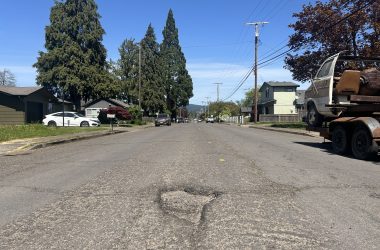Conserve. Protect. Educate. Connect.
McKenzie River Trust (MRT) has been branching out and offering tours to community members who want to connect with the land that surrounds them.
A nonprofit organization since 1990, MRT is a regional land trust which conserves and protects about 4,000 acres of land in Western Oregon. It aims to help people protect and care for the lands and rivers that they cherish in Oregon.
With that mission in mind, Connect with the Land tours are scheduled throughout the year in an effort to bring people to the land and learn more about MRT conservation projects, according to Holly McRae, events and outreach manager.
“We do (tours) with a variety of different subject matters, but basically the whole idea is just to connect people to what it is we’re doing and why we do it,” McRae said.

Holly McRae, events and outreach manager for McKenzie River Trust, discusses conservation projects during a recent Connect with the Land tour.
A recent tour was a beaver exploration led by Brian Bangs, an aquatic ecologist for the U.S. Fish and Wildlife Service who has been working with MRT for about 18 years. Bangs used to work on monitoring the Oregon chub, and he was part of the effort to get those fish delisted from the endangered species list.
“A lot of biologists don’t get to see this in their careers, so it was very, very exciting and very rewarding,” Bangs said.
Attendees met at an entrance to the Willamette Confluence and were let into the private property to listen to a 45-minute lecture about beavers and then go look around for signs of beavers being there – and get a chance to check out some of the beavers who live there.
“It’s really special when we can invite folks out here to kind of see what we’re doing,” McRae said. “And also learn a little bit more about why we’re protecting these types of land and the fish and wildlife that live here.”
An easy sign of a beaver’s existence is a beaver slide, which is exactly what it sounds like. Bangs said beavers will fell a tree and take everything they can from it before sliding down that path back into the water. Since they do this over and over again, all the foliage in that area is either taken by the beavers or completely crushed by the constant sliding.
After wandering around, looking at beaver slides and beaver lodges, the group walked about five minutes to a nearby pond where the beavers were. Lorna Baldwin said the beaver exploration was “calming and peaceful.”
“I encourage parents of young children to find a way to expose their kids to nature because that’s just not happening in a great way right now,” Baldwin said.
McRae said that MRT is on track to have about 100 tours this calendar year, although not all of them are public events. MRT often partners with private organizations such as the City of Eugene, Willamalane, and education groups at different schools.
As far as its future goes, MRT is looking toward creating some limited mobility tours in which MRT would get buses for people who may be using a mobility aid or can’t walk the usual 2-3 miles that walking tours typically entail.


Left, tour participants squint through their binoculars, to sight a beaver near a beaver slide. The tour is part of a McKenzie River Trust initiative to connect community members to their natural surroundings. Right, Participants examine a beaver tail.







